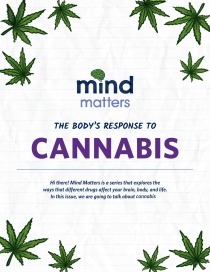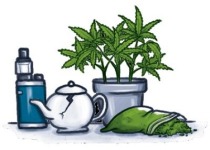
Hey there! Mind Matters is a series that explores the ways that different drugs affect your brain, body, and life. In this part of the series, we are going to talk about cannabis.
View the Mind Matters Teacher's Guide for a lesson plan and classroom activities to pair with this Mind Matters resource.
What is cannabis (marijuana)?
Cannabis refers to the dried leaves, flowers, stems, and seeds of the cannabis plant. You might have heard cannabis called other names, like “marijuana,” “weed,” or “pot.” Cannabis has hundreds of chemical compounds in it, including Delta-9 tetrahydrocannabinol (THC). THC is what makes a person feel “high.” THC causes people to change how they think, feel, or view things around them.
People think that because cannabis is a plant, it can’t be bad for them. But many dangerous drugs like cocaine, heroin, and tobacco also come from plants.

How do people take cannabis?
People can smoke cannabis rolled up like cigarettes, or it can be vaped with a device like a vape pen. Some people think that vaping is safer because they are not inhaling smoke. But studies show that vaping cannabis is harmful to your brain and body. Cannabis can also be mixed into foods like cookies, candies, gummies, or drinks. These are sometimes called edibles. Cannabis can also be made into an oil that is inhaled through smoking or vaping or applied on the skin as lotion or balms.
How does cannabis affect your brain?
The THC in cannabis can influence brain cells (neurons) in parts of the brain that control memory, emotions, and judgment. This can cause many effects, including:
- Feeling happy, relaxed or “high.”
- Being less coordinated.
- Losing track of time.
- Feeling anxiety, fear, distrust—being paranoid—or panic, especially after taking a lot of cannabis.
- Having a hard time telling what is real from what is not, which is called having a psychotic episode.
Over time, the THC in cannabis can harm your brain. It can change your brain in ways that make it harder to learn or remember things.
How does cannabis affect your body?
Taking cannabis can affect the rest of your body in different ways, too. These include:
- Giving you an upset stomach, stomach pain, or making you throw up.
- Making you feel hungrier.
- Making your heart beat faster.
Over time, cannabis can cause more serious health problems. These include:
- Breathing problems if it’s smoked or vaped.
- A cough that won’t go away, or lung damage.
Can you become addicted to cannabis?
Some people who use cannabis become addicted. Being addicted, which is also called having a substance use disorder, means that a person continues to use a drug even when it is causing problems for them at work, school, or at home. Anyone can become addicted to cannabis. It doesn’t matter how smart you are or where you live.
Even if they aren’t addicted, some people who use cannabis a lot will have withdrawal if they stop or cut back because their body has gotten used to having it. Withdrawal can cause people to feel angry or nervous, have trouble sleeping, have stomach pain, get sweaty, or feel shaky.
Are cannabis products safe to use as medicines?
The government has approved a few medicines made from cannabis. These medicines do not make a person feel “high.” Only a doctor can give these medicines. Scientists are looking at ways that chemicals in cannabis can help with health problems, but it will take years of research.

Is cannabis legal?
Laws on adults using cannabis recreationally are different from state to state, but it is not legal for teens in any state.
What if someone you know needs help?
If you think a friend or family member has a problem with drugs, talk to an adult you trust — like a parent, coach, or teacher — right away. You can also use the 988 Lifeline. This service is free, private, and open 24/7.Text, call, or chat 988 or visit https://988lifeline.org. Remember, treatment is available, and people do get better.
